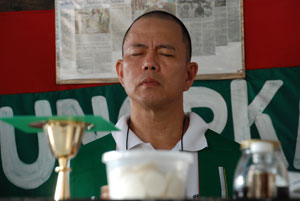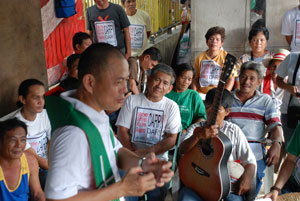Fr. Roberto Reyes
 It is almost four years since I left the Philippines on voluntary exile. My residence changed each year, at least five times in the last four years. I have lived a rather nomadic life in search of a most elusive truth, asking questions as I wandered from place to place: “Why is my country deteriorating, rapidly sinking in the mud of corruption; official lies and injustice? Why is social inequality worsening? Why is the Church losing its moral and prophetic voice at a time when it is most needed? What is my purpose, my place in this world of compromise, of ever shifting loyalties; convenient, commodified truth? Why is there betrayal; rejection; persecution; marginalization and the trivialization of relationship? Who and what is a real friend? Where and what is a real Church? Who and what is a real follower of Christ?”
It is almost four years since I left the Philippines on voluntary exile. My residence changed each year, at least five times in the last four years. I have lived a rather nomadic life in search of a most elusive truth, asking questions as I wandered from place to place: “Why is my country deteriorating, rapidly sinking in the mud of corruption; official lies and injustice? Why is social inequality worsening? Why is the Church losing its moral and prophetic voice at a time when it is most needed? What is my purpose, my place in this world of compromise, of ever shifting loyalties; convenient, commodified truth? Why is there betrayal; rejection; persecution; marginalization and the trivialization of relationship? Who and what is a real friend? Where and what is a real Church? Who and what is a real follower of Christ?”
By February 17, it would have been four years since I left for China in 2006. In the last four years answers to the questions did not come easily and clearly. Slowly, though, I have received some clarity and inner peace. All that hurt; anger; resentment and alienation due in part to what I have said and done in the past have revealed their inner roots and their outer sources of nourishment. I had to go away, be distant and invisible to be more present to that within me which is a source of pain; suffering; confusion and injustice in others. A quote in
“The Open Road,” Pico Iyer’s book about the Dalai Lama seems to capture what I have gone through and continue to struggle with, “It is the only thing we can do, Klaas, I see no alternative, each of us must turn inward and destroy in himself all that he things he ought to destroy in others.” (Etty Hillesum, on her way to her death, at twenty-nine in Auschwitz, in Open Road by Pico Iyer, p. 205)
I have gradually returned to active involvement in Philippine realities but not fully. I struggle to maintain the necessary tension between social engagement and inner transformation. Hillesum’s counsel “to turn inward and destroy in oneself all that one thinks he ought to destroy in others,” rings loud and clear in my mind and heart. It was in this frame of mind and state of soul that I was informed about my “Warrant of Arrest.”
A media friend calls me up to ask me whether I knew about my Warrant of Arrest. I was just as surprised as when I was informed about my first warrant of arrest on May 25, 2002, Friday. This time, it was also a Friday, a common practice to make it difficult to post bail which naturally forces the arresting officers to detain the person with the warrant over the weekend. That is the least of my concern. I will face my arresting officers. I will have myself arrested. I will choose not to post bail and welcome yet another opportunity to be among the most marginalized sector of society. I was then driving my elderly parents to the hospital for their regular check-up. I decided to keep mum about my Warrant of Arrest and be a dutiful son instead. Two days later, I had to leave for Palawan to report to Bishop Pedro Arigo, to whom I have volunteered my services as a priest. Later that week, I left for Hong Kong to report to the Asian Human Rights Commission where I have been working for the last two years.
This is the reason why the court is unaware of my whereabouts. This why I wish to inform QC Judge Marie Christine Jacob of my current mailing address at:
Asian Human Rights Commission
19/F Go-Up Commercial Building
998 Canton Road, Mongkok
Kowloon, Hong Kong, China
Furthermore, I have lost contact with my former lawyers since the last hearing which took place five or six years ago. In the meantime, I have contacted Atty. Francisco Chavez who defended me for my alleged involvement in the November 29 2007 Manila Pen incident. Atty. Chavez has agreed to take up my case.
Almost thirty five years after the senseless murder of my nephew Ernest Robert Lucas, there is still no justice, no closure. My nephew’s killer is still on the loose. He has not been accused nor convicted. My nephew’s family has been dispersed. A bitter memory, a gaping and painful wound remains untended. A father and mother, a brother and several sisters remain in grief. Another injustice is soon to be added to the Philippine universe of unsolved and forgotten cases. If not for the libel case slapped on me by father and son Enrile, Ernest Robert Lucas would have long joined the faceless and nameless army of the murdered and disappeared in the many secret Philippine killing fields.
 I welcome the Libel Case. I welcome my arraignment scheduled sometime April this year. I welcome the opportunity to stand on the witness stand to speak the truth in my heart and soul. Ernest Robert Lucas was murdered on September 1975. Both newspaper accounts and the personal account of my own first cousin, Ernest Robert’s father, retired Colonel Ernesto Lucas mention the name of the one who held the gun that was arrogantly pointed then fired at Ernest’s forehead instantly taking my nephew’s young 17 year old life. Thirty five years later this person walks freely around, enjoys power and wealth and enjoys the same impunity that protected him then and many others in the heyday of Martial Law.
I welcome the Libel Case. I welcome my arraignment scheduled sometime April this year. I welcome the opportunity to stand on the witness stand to speak the truth in my heart and soul. Ernest Robert Lucas was murdered on September 1975. Both newspaper accounts and the personal account of my own first cousin, Ernest Robert’s father, retired Colonel Ernesto Lucas mention the name of the one who held the gun that was arrogantly pointed then fired at Ernest’s forehead instantly taking my nephew’s young 17 year old life. Thirty five years later this person walks freely around, enjoys power and wealth and enjoys the same impunity that protected him then and many others in the heyday of Martial Law.
Ours is a society where stealing and killing can go unpunished and unnoticed. If not for the magnitude of the November 23 massacre in Maguindanao, killings in Mindanao have become routine. Those accused of masterminding and perpetrating the massacre are now being tried. Ironically, it is I and not the murderer of my nephew Ernest Robert Lucas who is on trial. I am being tried for libel, for what I said when asked, “Why I am so committed to the fight of justice and truth in the Philippines?” I need not repeat what I said in my interview for Paolo Bidiones’ Extra-Extra. I will repeat it in court and pray that it will not only once more uphold the truth in the hope that real justice will be serve to both victim and perpetrator of the crime concerned.
Let my libel case be another act of holy dissent against a manipulated and abusive justice system which favors the powerful and rich and continues to victimize the weak and the innocent.
I break my silence from my office in Hong Kong, the Asian Human Rights Commission and assert my right to speak the truth and demand justice for Ernest Robert Lucas. I do this both as a citizen and a priest. As citizen, it is my right as it is of all, to be able to express what I deem true and of benefit to the common good. As a priest, I speak the truth as part of my moral and holy duty as one consecrated to proclaim the Liberating and Healing Truth of the Word of God.